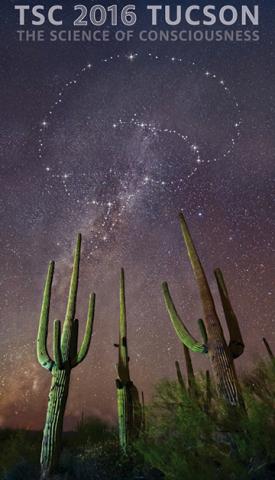
Computer scientists are not often invited to present their research at The Science of Consciousness annual conference, but University of California San Diego development engineer Stephen Deiss did just that. He spoke to the meeting in Tucson, AZ, in late April on the subject of "Romancing the Oxymoron: The 'Hardware Problem' of Machine Consciousness."
 "I presented my view that our preconceptions – about causality and mechanisms – bias us against accepting the possibility that machines can be conscious," said Deiss (at left), who earned his M.S. in computer science at Purdue University. "It leaves us believing that there is something spooky and unnatural about our own awareness, but I argue that consciousness is fundamental and scale-free in nature."
"I presented my view that our preconceptions – about causality and mechanisms – bias us against accepting the possibility that machines can be conscious," said Deiss (at left), who earned his M.S. in computer science at Purdue University. "It leaves us believing that there is something spooky and unnatural about our own awareness, but I argue that consciousness is fundamental and scale-free in nature."
Supported by CSE since 2013, Deiss first worked with the Non-Volatile Systems Laboratory of CSE Prof. Steven Swanson, but now splits his time between the Integrated Systems Neuroengineering Lab of Bioengineering professor Gert Cauwenberghs, and the new Pattern Recognition Laboratory of the Qualcomm Institute (both with CSE support). "We are focused on neurally-inspired or otherwise non-von Neumann computing paradigms," said Deiss, referring to new architectures that, unlike most of today’s computers, are not based on executing instructions sequentially. The scientist is looking particularly for neural applications to neuromorphic engineering and machine learning.
 In his presentation, Deiss noted that the "presumption that engineers cannot give [qualitative sensory and cognitive] sensations to machines is a reason many refuse to entertain the possibility of machine consciousness." He added that theories of consciousness have grown more sophisticated and quantitative. "I have maintained for over a decade that the crux of the problem is the assumption that there are laws operating on nature from a higher mathematical or divine realm," explained Deiss. "If one is able to abandon this view for a radically secular view of nature, the question becomes how natural systems do what they do from intrinsic principles and constraints rather than as externally directed."
In his presentation, Deiss noted that the "presumption that engineers cannot give [qualitative sensory and cognitive] sensations to machines is a reason many refuse to entertain the possibility of machine consciousness." He added that theories of consciousness have grown more sophisticated and quantitative. "I have maintained for over a decade that the crux of the problem is the assumption that there are laws operating on nature from a higher mathematical or divine realm," explained Deiss. "If one is able to abandon this view for a radically secular view of nature, the question becomes how natural systems do what they do from intrinsic principles and constraints rather than as externally directed."
The computer scientist argues that neuromorphic engineering, deep learning and other methods, as well as models based on free-energy theory and Bayesian inference, inevitably lead to the engineering of machines that can do more than we can. "I argue that all manner of systems, from atoms to brains and beyond, are conscious, with highly variable perceptual skills and a spectrum of self-reference," said Deiss. "Natural systems sense, detect and interpret when they interact and thereby assign meaning, but that is the same process that goes on in our predictive brains. I also argue that causal modeling is a heuristic that works, but it leads us astray in thinking about consciousness."
Deiss's ruminations on machine (and human) consciousness have deep roots, starting with dual undergraduate majors in psychology and philosophy at the University of Michigan. His first job out of graduate school involved applications of artificial intelligence, cognitive and computer science to computer-aided instruction. He went on to do hardware and software engineering in satellite communications, then high-energy physics, before beginning a 16-year career designing platforms for artificial neural networking. Ultimately, he gravitated to neuromorphic engineering (he calls himself a neuroengineer), and Deiss admits that his viewpoint on consciousness is a radical one: "A paradigm shift regarding consciousness is ultimately required -- and it's on the way."
Read the abstract for Stephen Deiss's presentation at The Science of Consciousness 2016.
Learn more about The Science of Consciousness 2016 conference.
Stephen Deiss profile and publications on ResearchGate

